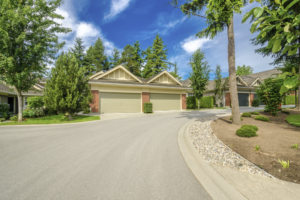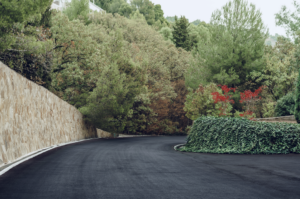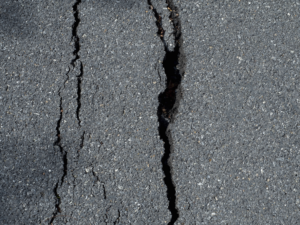If you’re tackling a paving project, choosing between hot-mix asphalt and cold-mix asphalt is one of the most important decisions you’ll make. Each serves a different purpose and offers unique advantages depending on the type of job, the time of year, and the condition of the surface. To get the best value and the longest-lasting results, it’s worth understanding how these two materials stack up.
What is hot mix asphalt?
Hot mix asphalt is the go-to choice for most new paving jobs. It’s produced by heating asphalt binder and aggregate materials to high temperatures, then applied while still hot. This heated process allows the materials to bond together tightly, creating a smooth, durable surface. Hot mix is commonly used for driveways, parking lots, and roads that need to handle frequent traffic and heavy loads. Because it cools quickly, it must be applied and compacted efficiently, typically during warmer months when the outdoor temperature supports proper curing. Once installed, it forms a solid, long-lasting pavement that resists weather damage, cracking, and rutting for many years when properly maintained.
What is cold mix asphalt?
Cold mix asphalt, on the other hand, is designed for flexibility and convenience. It’s made at lower temperatures and doesn’t need to be heated before use. Unlike hot mix, it can be applied in cold or damp conditions, which makes it especially useful for emergency repairs during the off-season. Cold mix is typically used for patching potholes or making quick fixes in low-traffic areas. While it doesn’t offer the same strength or longevity as a hot mix, it’s effective in situations where speed, accessibility, or weather limitations are key factors. Most cold mix patches are intended as temporary solutions that will eventually be replaced with a more permanent fix.
Weather and Timing Considerations
Weather plays a huge role in deciding which asphalt mix to use. Hot mix asphalt requires warmer temperatures to set and cure properly, so it’s usually applied during spring, summer, or early fall. If the temperature is too low, the asphalt may cool too quickly before it can be compacted, leading to weak spots or future damage. Cold mix asphalt has no such limitation. It can be stored for extended periods and used in nearly any weather. This makes it a great option when repairs can’t wait until warmer conditions return.
Longevity and Durability
In terms of performance, hot-mix asphalt is the clear leader. A well-installed hot mix surface can last anywhere from 15 to 30 years, depending on usage and maintenance. It provides a firm, stable surface that holds up under constant traffic, temperature changes, and even heavy equipment. Cold mix asphalt doesn’t offer the same lifespan. It breaks down more quickly under pressure and is more susceptible to moisture and temperature extremes. While it’s useful in a pinch, it’s not intended as a permanent fix.
Cost Comparison
Cold mix asphalt usually costs less upfront. It’s easy to work with and doesn’t require expensive equipment. Additionally, it can often be applied by maintenance crews without bringing in a paving contractor. For small patch jobs or temporary repairs, it’s a cost-effective choice. Hot mix asphalt, while more expensive initially, delivers much better value over time. It reduces the need for frequent repairs and offers a finished product that can significantly boost the appearance and value of your property. If you’re planning a long-term solution, the hot mix is well worth the investment.
Which one is right for you?
If you’re installing a new driveway, resurfacing a parking lot, or making long-term improvements to a high-traffic area, hot mix asphalt is the right call. It delivers the strength, appearance, and durability needed for surfaces that see daily use. But if you’re dealing with a pothole that popped up in the middle of winter or need to make a quick repair that can’t wait, cold mix asphalt is a practical and immediate solution until permanent work can be done.
How can Walt’s Paving help?
You can count on Walt’s Paving to complete your residential or commercial paving project in an efficient and timely manner. We have over 40 years of experience paving asphalt driveways, making asphalt repairs, and sealcoating asphalt. We are located in Osceola, IN, and service homeowners and businesses within 50 miles of Elkhart, IN. Call us today.







